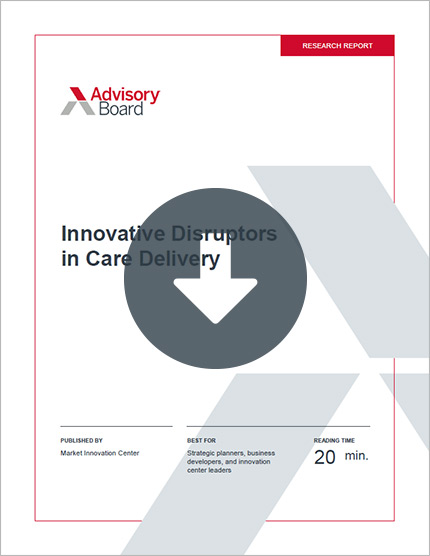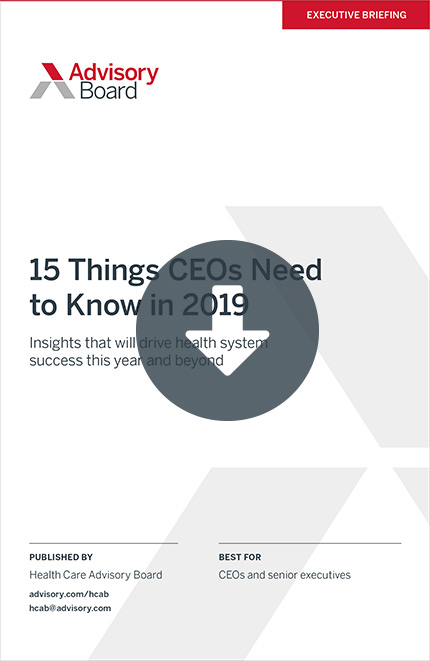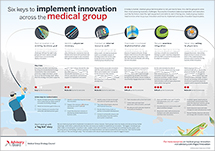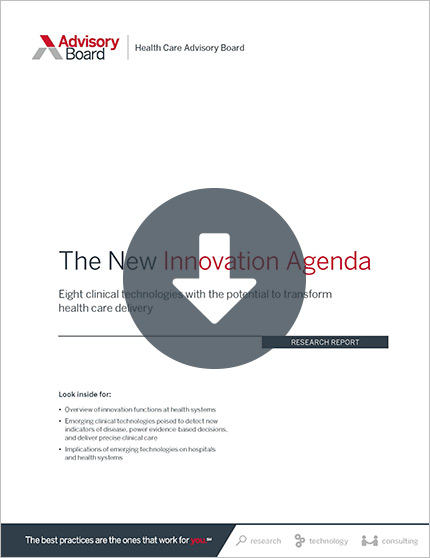Auto logout in seconds.
Continue LogoutBy Russell Davis, Executive Director
So-called "unicorns"—startup companies valued at $1 billion or more—used to be rare. When Aileen Lee coined the term in 2013, there were only 39. Today? CB Insights' database tracks 326, including 19 in the U.S. health care industry.
Armed with ample funding, prominent backers, and bold claims, each has the potential to shake up the health care industry. Let's dig into the unicorns, how much they've raised, and what they aspire to do.
Then, we'll explore the steps health care leaders can take today to prepare for disruption tomorrow.
Checklist: How to plan for digital innovation at your organization
The 19 'unicorns' shaking up US health care
Here are the 19 startups that, according to CB Insights, are worth more than $1 billion and are focused on the U.S. health care industry.
- Samumed (San Diego), $12 billion. Samumed uses small molecule drug development to develop and try new breakthrough treatments, including a treatment that eases pain in patients with joint issues by stimulating cartilage growth.
- Intarcia Therapeutics (Boston), $5.5 billion. Intarcia is developing products for their Medici Drug Delivery System that moderate drug release to allow patients to take novel medicines less frequently.
- Outcome Health (Chicago), $5 billion*. Outcome Health aims to bring digital screens that include helpful information for patients, such as interactive educational tablets and digital anatomy boards, to physician's offices.
- Oscar Health (New York), $3.2 billion. Oscar Health is a health insurer focused on improving the user experience. The company offers members free generic medication and unlimited telemedicine consults.
- GRAIL (Menlo Park, California), $2.46 billion. GRAIL is looking to develop a blood test that will detect cancer early in patients.
- Tempus Labs (Chicago), $2 billion. Using machine learning and genomic sequencing, Tempus Labs, a medicine technology company, develops custom treatment plans to combat tumors.
- Clover Health (San Francisco), $1.2 billion. Clover Health is a health insurance start-up that aims to sell Medicare Advantage (MA) insurance to seniors at lower costs to improve health outcomes and fill care gaps for low-income and elderly recipients.
- Devoted Health (Waltham, Massachusetts), $1.8 billion. The health care company helps seniors navigate health care with personal guides, and plans to launch MA plans.
- ZocDoc (New York), $1.8 billion. ZocDoc's web tool and mobile app allows consumers to book appointments with physicians and dentists online.
-
- 23andMe (Mountain View, California), $1.7 billion. The genomic and biotechnology company offers consumers that send a DNA sample the chance to learn about their ancestry, genes, and genetic predispositions for health.
- Butterfly Network (Guildford, Connecticut), $1.25 billion. The startup developed a portable ultrasound imaging system, called Butterfly iQ, that connects to consumer's smartphones. The technology can perform diagnostic imaging, measure blood vessels, and examine the cardiac, abdominal, and musculoskeletal systems, among others.
- Calm.com (San Francisco), $1.2 billion. The software company offers guided meditations and sleep stories through a free mobile app to help consumers reduce stress and calm anxiety.
- Human Longevity, (San Diego), $1.2 billion. Human Longevity is using genomic sequencing to develop a database of human genotypes and phenotypes as a reference to help treat and cure aging-related diseases.
- HeartFlow, (Redwood City, California), $1.19 billion. The company aims to give physicians a way to diagnose coronary artery disease in non-invasive ways, such as a coronary CT scans that analyzes patients' blood flow.
- Proteus Digital Health (Redwood City, California), $1 billion. The company's digital health feedback system allows patients to manage their health and collaborate with caregivers and clinicians by tracking their personal health choices and physiologic responses.
- Adaptive Biotechnologies (Seattle), $1 billion. Formerly Adaptive TCR, the company focuses on incorporating immunosequencing diagnostics into clinical care to improve diagnosis, prognosis, and treatment for cancer patients.
- Ginkgo BioWorks (Boston), $1 billion. By designing and printing DNA, the company aims to create custom microorganisms that have a lower environmental impact and waste for a variety of industries including pharmaceuticals, medicine, nutrition, and food.
- GoodRx (Santa Monica, California), $1 billion. Consumers can access affordable prescription drugs using GoodRx's platform which contains a list and map of prescription drugs—brand name and generic— from a variety of pharmacies. The company also offers consumers information on coupons, discounts, and price-matching.
- Health Catalyst (Salt Lake City),$1 billion. The data and analytics company develops machine learning solutions based on predictive analytics for value-based care and population health.
*Editor's note: Outcomes Health's CEO and President agreed to step down from the company in January 2018 after allegations of fraud. While investors agreed to reinvest in the company, they did not disclose the total valuation of the revised deal.
Only 19 unicorns?
Clearly, these companies are aiming to transform many corners of the health care world—but here's the question that struck me when thinking about this list: Why is there so little investment in health care?
Nineteen unicorns sounds like a big deal. But their $50 billion combined valuation is equivalent to that of just two non-health care unicorns: the video game designer Epic Games, and the e-cigarette company JUUL Labs.
Put another way: Investors are betting more on two companies encouraging my teenage son to play Fortnite and vape than those trying to keep him healthy.
The low level of investment is not for want of opportunity. Nearly every aspect of the field—clinical, operational, financial—could use some fresh thinking.
The problem is that, from an investor's standpoint, health care is a tough game to win. Its complexity, heavy regulation, nonprofit competition, and reputation for resisting change would test the patience of the most seasoned venture capitalist.
Still, disruption is coming—and you shouldn't fear it
So let's accept that, in the grand scheme of things, health care actually isn't facing all that much disruptive investment. If that's so, why do health care executives spend so much of their days fretting about disruption?
Well, this batch of billion-dollar, single-horned start-ups certainly has the potential to displace some incumbents. For example, genetic mapping and analytics might eliminate the need for some existing patient testing (which many systems rely on as high-margin services). Personalized therapies could replace current treatments with shorter, more focused approaches. And new health plans are already stealing market share from more established players with the promise of cheaper coverage and a better experience.
If you work in one of these niches, perhaps you should be afraid. But the rest of us should remember: Disruption giveth as well as taketh away. For instance, sophisticated diagnostics and analytics will likely detect more conditions, which will be treatable with newer and more personalized approaches. This will translate into new revenue streams for physicians and health systems, and it may reduce the total cost of care for health plans.
How to get ready for the unicorns' arrival
So if disruption can benefit existing companies, how should you approach these unicorns' arrival? I'd focus on two key challenges:
- Get ready for new payment models. The unicorns promise a world with better health and less suffering than at any time in human history, if we can figure out how to pay for it. As a society, Americans have chosen to pay for health care through a patchwork of partially subsidized, often clumsy quasi-market mechanisms. It's hard to imagine our current funding models enabling wide-scale adoption of early detection and treatment of costly conditions. Many of the innovations have the potential to reduce long-term health care costs, but we have to figure out how to make super-sized payments in the near-term to fund them. I expect that the change won't be systemic, but we'll begin to see innovative, outcomes-based payment models emerging as solutions. These new models likely will be incremental to existing payment approaches, further complicating the revenue cycle for providers and payers.
- Choose carefully which disruptors you'll embrace—and then act quickly. In a world where so many potential breakthroughs appear within reach, organizations must develop adoption plans that ensure progressive successes. Even if every unicorn offers a positive return, the frictional costs associated with embracing each one are significant. There will be processes to change, systems to re-code, staff to re-train. No organization can take them all on at once. Providers and payers must determine which innovations offer a tolerable amount of frictional cost, tangible benefit in an acceptable timeframe, and a very high likelihood of success. They then must rigorously prioritize adoption, firmly resisting the urge to keeping chasing the innovations further down the list (even if they appear attractive). Saying "no" to many of these initiatives today becomes essential for success tomorrow.
Above all, leaders should not ignore these new market players. They need to engage with this list and build plans that incorporate it. That can be stressful, so if all of this disruption talk is keeping you up at night, try counting unicorns. And if that doesn't work, there's always Calm.com (see #12).
Next steps
To learn more about how leading medical groups are adopting some of these unicorn's innovations, download our Guide to Implementing Digital Health Innovations.
Then, to learn more about the innovative technologies that are poised to transform health care, download our report, The New Innovation Agenda.
Finally, to learn much more about how disruptors are impacting the payer market, make sure you register for our 2019 Health Plan Advisory Council National Meeting.
New checklist: 7 critical steps to plan for digital innovation
Success with digital innovation will require discipline, a results orientation and a willingness to fail. Organizations must take a deliberate approach using 7 critical steps
This checklist will help you guide your organization's discussion on how to get started or advance your organization's digital innovation strategy.
Don't miss out on the latest Advisory Board insights
Create your free account to access 1 resource, including the latest research and webinars.
Want access without creating an account?
You have 1 free members-only resource remaining this month.
1 free members-only resources remaining
1 free members-only resources remaining
You've reached your limit of free insights
Become a member to access all of Advisory Board's resources, events, and experts
Never miss out on the latest innovative health care content tailored to you.
Benefits include:
You've reached your limit of free insights
Become a member to access all of Advisory Board's resources, events, and experts
Never miss out on the latest innovative health care content tailored to you.
Benefits include:
This content is available through your Curated Research partnership with Advisory Board. Click on ‘view this resource’ to read the full piece
Email ask@advisory.com to learn more
Click on ‘Become a Member’ to learn about the benefits of a Full-Access partnership with Advisory Board
Never miss out on the latest innovative health care content tailored to you.
Benefits Include:
This is for members only. Learn more.
Click on ‘Become a Member’ to learn about the benefits of a Full-Access partnership with Advisory Board
Never miss out on the latest innovative health care content tailored to you.




